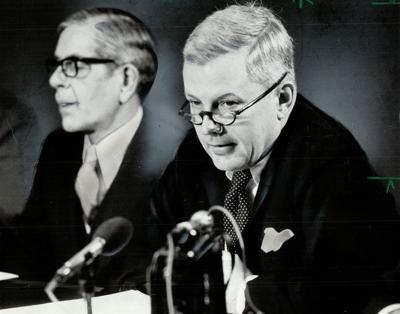White with blue stripes and discreetly lettered CF-BNK, the Hawker Siddeley jet sat on the tarmac like an ocelot straining at an unaccustomed leash. An aircraft is the ultimate business status symbol, the corporate magic carpet awaiting the ownerās bidding.
A black Cadillac pulled up. Out clambered Bill Mulholland, chairman and CEO of Bank of Montreal from 1979 to 1989, with the measured gait of a man who knew that whomever he was meeting would patiently await his often belated arrival.
For my part, the five-and-a-half hour flight from pc28¹ŁĶųto Calgary in 1982 was an exceptional amount of time for a journalist to spend with his quarry compared to the usual 30-minute interview in some workplace. Beneath Mulholland were 1,200 branches and 27,000 employees with offices open twenty-two hours every day, somewhere in the world.
The bank was moribund when he arrived in 1975. The turnaround was quick. āI just knew when the engine had caught, sometime early in 1977,ā he said. By 1978, two-thirds of the thirty vice-presidents there when he arrived were gone.
The U.S.āborn Mulholland had a Harvard MBA and experience at Morgan Stanley where he masterminded a $500-million bond deal for the Churchill Falls power project in Labrador and then went to work for the builder, Brinco.
For much of the flight Mulholland talked to me while he stood in the aisle of the plane, elbows against the chairbacks. At five-foot-nine and 190 pounds, he looked like a Notre Dame fullback. A cap of close-cropped grey hair topped a head perched directly on his body. He seemed to have no neck, his shoulders frozen in an eternal shrug.
‘Itās amazing what you can achieve in ten years,’ multi-millionaire Shark Tank star Robert
Mulholland was not the most courteous individual. Heād been known to hear some brave executive begin a sentence, then override those faltering words with multiple paragraphs of his own that swept away the otherās thoughts like waves erasing names in the sand. Itās as if no one else could speak, or even exist, except as up against a wall against which Mulhollandās own words were tested and never found wanting.
On this flight, 35,000 feet up, banking was not the only thing on his mind. He recounted war stories from his time with the U.S. Army in the Philippines during the Second World War. One tale was about an enemy sniper who was a poor shot. While telling the anecdote, Mulholland laughed so hard that tears formed in his eyes and his entire body shook as his coffee sloshed around in its mug while his free hand punctuated his words.
On stage that evening, Mulhollandās light-hearted manner continued with oil-patch executives attending that yearās Outlook Conference. āI get a sense of pending tragedy,ā he began, āwhen I see the smiling hopeful faces, and I know whatās in store for you. Youāll go out trembling wrecks, dabbing at your eyes.ā
The group survived the forecast then moved to a dinner of salmon with fine wine. Guest speaker was Arthur Laffer, the laid-back Californian author of the Laffer Curve which argues a capitalist theory that lower tax rates can actually increase government revenue. Mulholland was still in a merry mood when he introduced Laffer. āMr. Laffer has told me,ā he began with a smirk, āthat his favorite curve happened when a bikini dropped off one shoulder.ā Mulholland waited for the laughter to subside, and then added, āThatās my kind of economist.ā
When the evening was over, it was well past midnight by the mental clock that had begun ticking inside Mulhollandās head when he left Toronto. Heād been aboard the flight, met with Calgary staff, oversaw a two-hour presentation on the economy, a reception, dinner and another speaker. All this with not a hair askew nor a word put wrong.
Fumbling photo of Stanfield became a metaphor for his beleaguered campaign, writes Rod McQueen,
Earlier in the day,Ā Mulholland, who died in 2007, had taken several runs trying to explain banking to me. āBanking is intellectually challengingĀ ā if you enjoy doing puzzles.ā He tried again. āYouāre doing it from duty. Not doing it is not acceptable. Itās not the sort of thing you take off like a coat. You just canāt go to the directors and say, āChaps, Iāve had enough.āā
āI donāt really do banking. I donāt get to do the equivalent of kicking the tires. I used to like going out with the geologists when I was at Brinco, out into the field. That was fun. Iād feel guiltyĀ ā the Presbyterian genes in me coming out, I guess.ā
āThe ultimate accolade is when they say: āMulholland, we donāt need you anymore.ā Like manās earliest effort, you have created a tool that can be used over and over again. In fact, thereās no way of knowing how you did until after youāve left.ā
With that, he climbed into another Cadillac come to do his bidding. Driver, he said, to immortality, please.
































To join the conversation set a first and last name in your user profile.
Sign in or register for free to join the Conversation